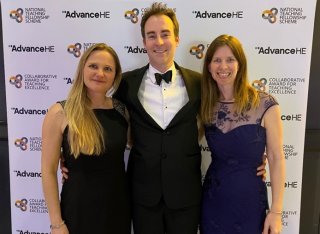
Professor Christine Rivers
About
Biography
Christine Rivers is Professor of Mindfulness and Professional Development and People Development Lead at Surrey Business School and . Her research focuses on the intersection of mindfulness and contemplative practices with business education in the context of personal and professional development, and the impact of technology including Artificial Intelligence (AI) on student experience and staff wellbeing in Higher Education.
Christine has played a significant role in shaping business and management education globally through a range of senior academic service positions both within and beyond the University of Surrey. At Surrey, she has served as Head of Department, Director of Studies, and Associate Head of Education. Externally, she has held numerous leadership and editorial roles, including Executive Member of the Management Education and Development (MED) Division of the Academy of Management (Programme Chair 2024), Chair of the Academy of Management Teaching and Learning Conference (2020-2024), Associate Editor for the Journal of Management Education (since 2019), and reviewer for Academy of Management Learning & Education (2018-2022). She has also served as SIG Chair for Learning and Knowledge at the British Academy of Management and as an Executive Member of the Learning, Teaching and Student Experience Conference (LTSE) and Chartered Business and Management Educator (CMBE) working group for the Chartered Association of Business Schools. Christine continues to contribute to professional bodies internationally through visiting, advisory, and consultancy roles, with a focus on strengthening professional standards and influencing policy to support the ongoing development of the discipline.
Alongside her academic role, Christine brings extensive professional practice to her work. She is a qualified Hypno-Psychotherapist and UKCP trainee, an executive mindfulness coach, and an experienced yoga, meditation, and breathwork teacher. This interdisciplinary background informs her teaching, research, and leadership practice, with a particular emphasis on developing self-aware, ethical, and resilient future leaders. She also has strong connections with, and extensive experience of working alongside, charities in the mental health and disability sector, informing her commitment to inclusive, compassionate, and socially responsible education and leadership.
In recognition of her contributions to service, leadership, teaching and scholarship, Christine has received awards and commendations from the Advance HE, Academy of Management, British Academy of Management, the Management and Organizational Behavior Teaching Society. She is a National Teaching Fellow with Advance HE (UK) and also holds Senior Fellowship. Christine regularly publishes in academic journals, writes for Times Higher Education, and delivers keynote addresses and podcast talks on mindfulness, professional development, leadership, and education.
Christine is the author of Mindfulness and Business Education: Developing Self-Aware Future Leaders – A Practical Guide, published by Routledge in November 2024.
Areas of specialism
University roles and responsibilities
- People Development Lead (Chair) for Surrey Business School
Previous roles
Head of Department for Management Education (2020-2024)
Affiliations and memberships
programme chair AoM 2024, Chicago
News
ResearchResearch interests
Christine's research focuses on mindfulness and contemplative practice. She is particularly interested in understanding the intersection with technology, employability and lifestyle and wellbeing in business education and beyond.
Research projects
ADD philosophy is grounded in five inclusive principles for learning and teaching: Explore, create, collaborate, share and reflect. These principles are equally important for students while learning and academics while designing modules. The ADD method is based on five practical steps, identified throughout years of testing and in-depth research on visual usability:
Step 1. Template and content > Unified structured module design template and consistent approach to embedded content
Step 2. Supporting visuals > Individual conceptual module maps with weekly module maps and use of decorative images for content (e.g. weekly agendas, activities, narratives)
Step 3. Learning icons > Integrated learning icons to enhance student learning and signpost particular aspects in both the VLE and learning materials
Step 4. Narratives > Scaffolded learning through guided activities and captured content accompanied by short narratives and hyperlinked content
Step 5. Learning resource sets > Including sets of bite-size videos and deeper learning materials (activities scaffolded with narratives).
While ADD suggests following these five steps to warrant a holistic student experience, each step can also be implemented separately or over time. ADD is therefore a flexible approach to designing hybrid learning and teaching journeys, guided by questions of value and purpose.
While a consistent, templated approach is advocated for all modules on a particular programme to ensure students are able to easily navigate through modules without getting lost or having to adapt to different structures, the team also strongly believe that module personality and academic voice is crucial. These can be achieved by individual bespoke module maps and narratives to support learning. In addition, where face-to-face time is reduced, the use of narratives often replaces corridor chats and pre and post lecture conversations.
Research interests
Christine's research focuses on mindfulness and contemplative practice. She is particularly interested in understanding the intersection with technology, employability and lifestyle and wellbeing in business education and beyond.
Research projects
ADD philosophy is grounded in five inclusive principles for learning and teaching: Explore, create, collaborate, share and reflect. These principles are equally important for students while learning and academics while designing modules. The ADD method is based on five practical steps, identified throughout years of testing and in-depth research on visual usability:
Step 1. Template and content > Unified structured module design template and consistent approach to embedded content
Step 2. Supporting visuals > Individual conceptual module maps with weekly module maps and use of decorative images for content (e.g. weekly agendas, activities, narratives)
Step 3. Learning icons > Integrated learning icons to enhance student learning and signpost particular aspects in both the VLE and learning materials
Step 4. Narratives > Scaffolded learning through guided activities and captured content accompanied by short narratives and hyperlinked content
Step 5. Learning resource sets > Including sets of bite-size videos and deeper learning materials (activities scaffolded with narratives).
While ADD suggests following these five steps to warrant a holistic student experience, each step can also be implemented separately or over time. ADD is therefore a flexible approach to designing hybrid learning and teaching journeys, guided by questions of value and purpose.
While a consistent, templated approach is advocated for all modules on a particular programme to ensure students are able to easily navigate through modules without getting lost or having to adapt to different structures, the team also strongly believe that module personality and academic voice is crucial. These can be achieved by individual bespoke module maps and narratives to support learning. In addition, where face-to-face time is reduced, the use of narratives often replaces corridor chats and pre and post lecture conversations.
Supervision
Postgraduate research supervision
Christine supervises MSc and doctoral students in the area of business and management education, mindfulness and leadership.
Teaching
Christine leads and teaches on he Postgraduate Certificate in Management Education, which is aimed at practitioners, ECR and those without a valid or relevant teaching qualification in Management Education.
Christine has taught on all levels prior predominantly marketing, qualitative research methods and dissertation/ business model projects.
Publications
Highlights
Rivers, C. (2025). Mindfulness and Business Education, Developing self-aware future leaders - A practical guide. Routledge.
Mindfulness and Business Education: Developing self-aware future leaders is a practical guide for educators and academics with teaching responsibilities in business schools or colleges. Business schools have a responsibility to equip future leaders with the right knowledge and the right skills to make the right decisions, particularly in times of volatility, uncertainty, complexity, and ambiguity. This responsibility can only be met if business schools change the way they teach and develop self-aware future leaders who are grounded in the foundations of mindfulness.
The book is divided into three parts: Why, What, and How. Part One: Why introduces the foundations of mindfulness, draws on the history of business school development, and discusses leadership approaches presently taught in business schools. Part Two: What discusses ways of measuring mindfulness, the need for training business educators as mindfulness facilitators, and the contextualisation of mindfulness in contemporary business topics such as wellbeing, sustainability, diversity, and artificial intelligence. Part Three: How provides case studies and scripted resources for immediate use and implementation in extracurricular or co-curricular activities to design mindfulness-based modules and courses, to introduce mindfulness coaching as part of pastoral care and staff development, and to develop mindfulness-driven business education strategies.
This is an ideal book for those in business education looking to use mindfulness to develop future managers and leaders.
Available from Routledge or Amazon.
Fukami, C. V., Hamilton, A. L., Rivers, C., Holland, A., Brady, M., Fellenz, M., ... & Leben, D. (2025). Human-Centered Business Education in an Artificial Intelligence-Driven World. Journal of Management Inquiry, 10564926251364213.
How shall we use AI in Business Education is at the heart of this essay. We propose that our relationship with AI needs to be grounded in intention, mindfulness, responsibility
and consciousness.
towards personalized responsive management education, Martin Fellenz, Sabine Hoidn & Mairead Brady (eds) The Future of Management Education (forth coming, Dec 2021), Routledge.



